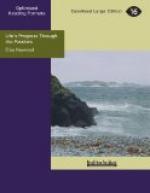During the time of his indisposition he had been attended by an old nurse, who had served in the same quality to his mother, and several others of her family.—The tenderness this good creature shewed to him, and the care she took to humour him in every thing, not only while he continued in a condition, in which it might have been dangerous to have put his spirits into the least agitation, but after he was grown well enough to walk abroad, had made him become extremely pettish and self-willed; which shews, that an over-indulgence to youth, is no less prejudicial, than too much austerity.—Happy is it for those who are brought up in a due proportion between these two extremes; for as nature will be apt to fall into a dejection, if pressed down with a constant, and uninterrupted severity, so it will infallibly become arrogant and assuming, if suffered always to pursue its own dictates.—Nothing is more evident, than that most of the irregularities we see practised in the world, are owing originally to a want of the medium I have been speaking of, in forming the mind while it is pliable to impression.
This was not, however, the case of Natura; and though he would doubtless have been what we call a spoiled child, had he been for any length of time permitted to do just what he pleased, yet the nurse being discharged, he fell again under the jurisdiction of his mother-in-law, who had now more excuse than ever for treating him with severity.
His father did not want understanding, but was a good deal more indolent than befits a parent.—He had always been accustomed to live at ease, and his natural aversion to all kinds of trouble, made him not inspect into the manners or temperament of his son, with that care he ought to have done. Whenever any complaints were made concerning his behaviour, he would chide, and sometimes beat him, but seldom examined how far he really merited those effects rather of others resentment than his own. Sometimes he would ask him questions on his progress in learning, and praise or dispraise, as he found occasion; but he never discoursed with him on any other topics, nor took any pleasure in instructing him in such things as are not to be taught in schools, but which much more contribute to enlarge the mind; so that had not Natura’s own curiosity led him to examine into the sources, first causes, and motives of what he was obliged to read, he would have reaped no other benefit from his Greek and Latin authors, than meerly the knowledge of their language.
Here I cannot help taking notice, that whatever inconveniences it may occasion, curiosity is one of the greatest advantages we receive from nature; it is that indeed from which all our knowledge is derived.—Were it not for this propensity in ourselves, the sun, the moon, and all the darling constellations which adorn the hemisphere, would roll above our heads in vain: contented to behold their shine, and feel their warmth, but ignorant of their motion and influence on all




